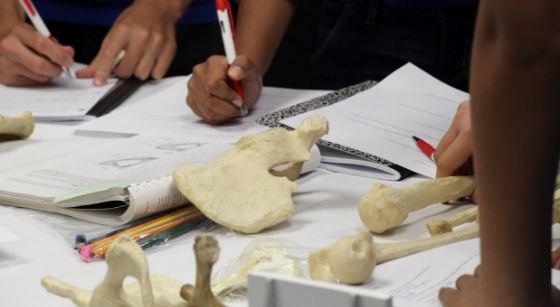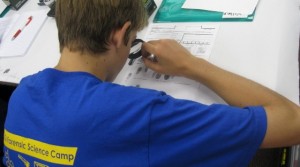By Amanda Holst, Public Affairs Assistant
Sixteen middle and high school students, ages 13 to 17, got a chance to uncover the secrets of a crime scene at SJSU’s first-ever Forensic Science and Crime Scene Investigation Camp, offered by SJSU’s Department of Justice Studies July 9-13.
“The goal is to inspire students into careers where they are helping to solve crimes,” said Steven Lee, the camp’s director and a professor of justice studies.
Wearing crime scene “do not enter” tape as sashes, campers worked in teams of four to look at evidential material used during a crime scene investigation. Each team carefully observed, collected and interpreted fingerprints, bloodstain patterns and DNA, applying tools they learned in forensic science, criminology, neurology and forensic anthropology workshops.
“Everyday I see them, I get a chance to see the light inside them that ignites on how they really like forensic science,” said lead camp counselor Phillip Nhan, ’11 Justice Studies.
The CSI camp was held simultaneously with the AAFS Forensic Science Educators Conference, which seeks to raise and strengthen overall science education in the United States. Last year, SJSU was the first West Coast university to sponsor the teacher conference.
Working With Real-Life Crime Scene Investigators
According to Lee, the collaboration brings students the latest information, allows them the opportunity to work with real-life crime scene investigators and forensic scientists in the field, and dispels fallacies on how crime scenes are being portrayed on television.
“Everything is so predictable on those shows,” said 17-year-old camper Matthew Shull, whose favorite part of camp was uncovering fingerprints with magnetic powder. “Everything always happens the right way and they always find the right evidence and the right person.”
According to Lee, this year’s camp will serve as a national model for future CSI camps. The American Academy of Forensic Sciences donated 10 scholarships to cover registration fees and supplies.


